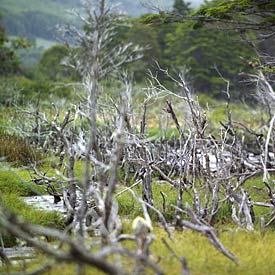Press release Mai 21st, 2008
Biodiversity as a natural resource
Bonn/Berlin. What will the loss of biodiversity cost us in the long term? How much do national economies need to invest now in order to stop the trend? And what price will we have to pay if we do not act? These are the questions the TEEB - The Economics of Eco-systems and Biodiversity - project is seeking to answer. The pilot study led by Pavan Sukhdev, who is head of Deutsche Bank’s Global Market Centre in London, was commissioned by the German Federal Ministry for the Environment (BMU) and the European Union. The BMU asked the Helmholtz Centre for Environmental Research (UFZ) to co-manage the scientific contributions to the study. Preliminary results will be presented at a press conference during the 9th UN Conference on Biological Diversity (COP9) in Bonn, Germany on 29 May, which will be followed by an event open to the general public the same evening.

What will the loss of biodiversity cost us in the long term? How much do national economies need to invest now in order to stop the trend? These are the
questions the TEEB - The Economics of Eco-systems and Biodiversity - project is seeking to answer.
Photo: André Künzelmann/UFZ
"Biological diversity not only maintains the equilibrium of ecosystems, it is also an inexhaustible source of potential new drugs. It helps sustain a healthy food chain and promotes water and soil quality," says Prof. Jürgen Mlynek, President of the Helmholtz Association. "Its value goes far beyond anything we can describe using economic indices, yet the material benefits it offers humankind are also tremendous." Five thousand United Nations delegates from 190 countries will gather in Bonn from 19 to 30 May 2008. During the conference, they will focus primarily on discussing potential ways to halt the steady decline of biological diversity. "We are currently experiencing the sixth wave of extinctions in the history of our planet; this one has primarily been caused by hu-mans encroaching on the habitats of other species. And we are only now beginning to understand the economic value of biological diversity," explains Mlynek.
Financial expert Pavan Sukhdev estimates that the "value" of the services offered in the nature reserves on the world’s five continents (not counting marine parks and reserves) –adds up to around $5 billion per year. Yet establishing the global value of biodiversity is not the main focus of the study. As is the case with global warming, it is the poor, particularly those in developing and emerging economies, who stand to suffer the most from the loss of so-called ecosystemic services. Preserving biodiversity is thus necessary if we are to fight global poverty and attain the Millennium Development Goals.
The Helmholtz Centre for Environmental Research acted as co-coordinator of the scientific contributions to the study. Researchers at the UFZ are currently preparing to continue collaborating on the report, which will move on to the next phase after COP9. Dr. Heidi Wittmer, a senior researcher at UFZ who helped compile the report, spoke of her hopes for the project: "The Stern Review changed the way we look at the economic consequences of climate change. It is our hope that the TEEB Report will do the same for biodiversity. It is becoming clear that stopping the extinction of species is not merely a romantic notion, but is actually crucial for human survival."
Exhibition: "Millionen Arten zu leben" (Millions of Ways of Life), Plaza of Diversity, near Robert-Schumann-Platz, Stand 30; open Monday to Friday from 1 p.m. to 3 p.m. and from 6 p.m. to 8 p.m. from 19 to 26 May, and daily between 10 a.m. to 8 p.m. from 27 to 30 May.
UFZ-Special on biodiversity, available in English and German
UFZ-Newsletter Special
More information:
Helmholtz Centre for Environmental Research (UFZ)
Dr. Heidi Wittmer
Phone +49 341-235-1629
Dr. Heidi Wittmer
oder über
Helmholtz Centre for Environmental Research (UFZ)
Press office
Tilo Arnhold / Doris Böhme
Phone +49 341 235 2278
presse@ufz.de
Links
The Economics of Ecosystems and Biodiversity (TEEB)
www.ufz.de/index.php?en=17633
The ninth meeting of the Conference of the Parties (COP 9)
www.cbd.int/cop9
www.bmu.de/naturschutz_biologische_vielfalt/un-konferenz_2008
Das Helmholtz-Zentrum für Umweltforschung - UFZ wurde 1991 gegründet und beschäftigt an den Standorten Leipzig, Halle/S. und Magdeburg rund 800 Mitarbeiter. Es erforscht die komplexen Wechselwirkungen zwischen Mensch und Umwelt in genutzten und gestörten Landschaften, insbesondere dicht besiedelten städtischen und industriellen Ballungsräumen sowie naturnahen Landschaften. Die Wissenschaftler des UFZ entwickeln Konzepte und Verfahren, die helfen sollen, die natürlichen Lebensgrundlagen für nachfolgende Generationen zu sichern.
The Helmholtz Association contributes to solving major challenges facing society, science and the economy with top scientific achievements in six research fields: Energy, Earth and Environment, Health, Key Technologies, Structure of Matter, Transport and Space. With 26,500 employees in 15 research centres and an annual budget of approximately 2.35 billion euros, the Helmholtz Association is Germany’s largest scientific organisation. Its work follows in the tradi-tion of the great natural scientist Hermann von Helmholtz (1821-1894).
